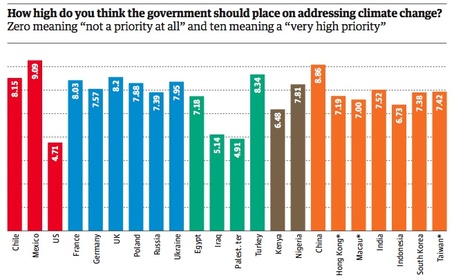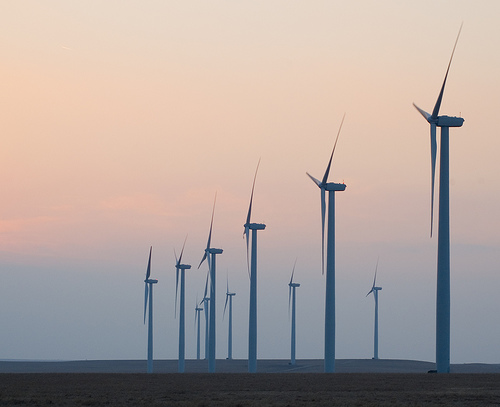Last night The Day After Tomorrow was on cable. It was one of the spate of big-budget Hollywood disaster porn films which came out in the late-nineties and early noughties which I had not seen before. The disaster in this film is a sudden and catastrophic ice age, triggered by the melting of the Artic and Greeland ice sheets, stopping the North Atlantic Current which keeps most of Europe and North America habitable and which, over the course of just a few days, freezes half the Northern Hemisphere, setting the scene for the heroic "struggle to survive" scenes always featured in movies of this ilk.
[youtube=http://www.youtube.com/watch?v=SnvqsWVluCE]
So the film is, obviously, a bit over the top, and riddled with scientific inaccuracies as these things always are. But the general premise of government's refusing to take action on global warming until it's way, way too late is something that it's becoming increasingly hard to believe won't happen. Being in America is filling me with despair about our capacity to respond in time to avoid catastrophe and never more-so than when I saw this poll conducted by the University of Maryland, which asked people in 19 countries to rank on a scale of 1-10 how high a priority their government should place on addressing climate change:

America stands out as being, of the countries polled, uniquely disinterested in government action to address climate change. And whereas the Iraqi's and Palestinians justifiably have other things they think their government should be focusing on, in America the blame can only be placed on the presence of a well-funded denialist lobby, replaying exactly the delaying tactics of the tobacco industry. Their goal is not to prove that climate change is not happening, but to sow enough doubt about the science to forstall real action. So far they've been extremely successful, especially in the US and, sadly, Australia. The above poll shows just how successful, and what a steep hill we have to climb to get real action here in the world's greatest carbon emitter, without whom no strategy to address climate change can be successful.
This reminded me of a letter I read years ago, by Paul Gilding, former CEO of Greenpeace International, on the 10th anniversary of the founding of Ecos Corporation, which he has since left. The letter was entitled Scream, Crash, Boom. In it he declared that environmentalists had lost, that despite thirty years of concerted efforts, the development of huge global NGOs and contribution of millions of hours of activism, the chance to avert catastrophic climate change had passed. The forces resisting this change were just too big, or the tactics used had been insufficient, whatever the reason all the shouting for change (the "Scream" of the title) had failed to move enough people to force the world's governments to take action. "We tried. We failed. It is what it is."
Therefore the Crash is coming, where we will see the impact of climate change in very real and terrible ways, whether through a Day After Tomorrow-style snap ice age, pandemic bird flu, peak oil or drought for decades without end (which seems to have already arrived in much of Australia). Millions will be displaced or, potentially, killed. "However it unfolds, it is certainly in my judgement going to be ugly, probably very ugly. You can’t keep messing with the system that feeds you, eating away at your capital without bad stuff happening in response."
However then would come the "Boom", the explosion of human ingenuity possible when we are mobilized around an immediate problem. Humans are unique in our ability to adapt and change, we are just not very good at doing so until we absolutely have to (and sometimes not even then). When we are confronted with problems we experience first-hand, when people start dying (in the Western World) we will respond. "When we do, it’s going to be really interesting. We’ll reinvent cars that make today’s technology look as primitive and stupid as it is. We’ll have energy created everywhere as our roofs and cars become generators rather than consumers of power. Water will just go around and around our houses and we’ll use it on the way through."
I wish I was as optimistic as Paul. I think the Crash is inevitable, we are doing pitifully little to prevent it, and most Americans think we should be doing little more. Where leadership is needed we instead have denial, obfuscation and confusion. So long as there are dollars to be made. But the Crash is coming, and there are dollars to be made in helping us respond to this challenge as well. So how late will we wait, how bad will it need to be before denial turns into action?
Even if we have lost the opportunity to prevent destruction and displacement there is still so much to fight for, every day we lose to inaction will make the Crash worst, the correction harder, the loss of life greater. Every day is another chance to turn it around, before it is truly too late.
While looking up the link to Paul's original Scream, Crash, Boom letter from 2005 I discovered he wrote an updated, Scream, Crash, Boom II letter last year, where he claimed that the "Great Disruption" has already begun:
I want to be clear though that this is not the “end of the world”. It does, however herald an unparalleled era of system stress, economic stagnation and social tension – a global emergency during which we’ll evolve a new economic model and then rebuild. I call it The Great Disruption because it is most likely to be a disruption in society’s evolutionary process, rather than the collapse of civilisation.
It's worth reading in full. And then it's worth considering what you can do, to change both your lifestyle and the minds of your fellow citizens, to help bring about the change we need.
Related: the Pentagon has begun studying the national security implications of Climate Change, which may require military intervention to "deal with the effects of violent storms, drought, mass migration and pandemics".
 I left Washington DC in June and was amazed on a visit back this weekend how much seemed to have changed in the urban environment in this short time. The biggest change I'm thrilled about is the launch of a new shared bike scheme - Capital Bikeshare - already now the biggest in the USA.
I left Washington DC in June and was amazed on a visit back this weekend how much seemed to have changed in the urban environment in this short time. The biggest change I'm thrilled about is the launch of a new shared bike scheme - Capital Bikeshare - already now the biggest in the USA.
 So this Saturday is
So this Saturday is 
